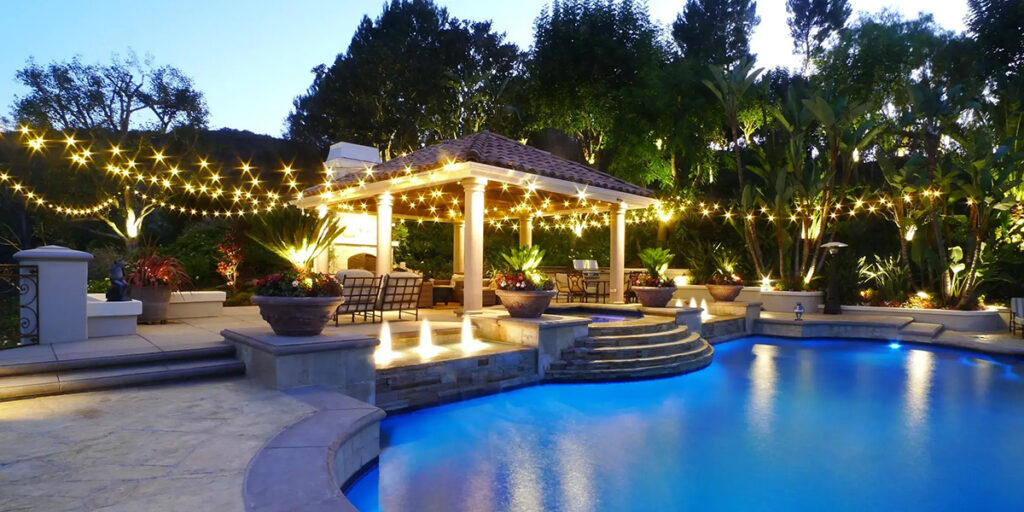You notice that one of your functional outdoor lights has blinked out as you step onto your porch. You have a spare bulb, but it’s labeled for indoor fixtures. Can you use indoor light bulbs outside?
Austin Outdoor Lighting Design is your trusted source for landscape lighting in Austin, Texas. We know how an indoor bulb differs from its outdoor counterpart. Our lighting technicians outline whether you can safely screw it into the porch fixture below.
How Indoor Lights Differ From Outdoor Lights
When comparing indoor vs. outdoor bulbs, you might think it doesn’t matter much which you use or where, because each illuminates a dark space. However, while you can use a bulb explicitly designed for outdoor settings in any location, you can’t always say the same for the indoor bulbs.
Indoor light bulbs and fixtures are often made from different materials and manufacturing processes, making them less sturdy than outdoor products. So, can you use indoor light bulbs outside?
Can You Use Indoor Light Bulbs Outside?
You might be able to screw your indoor bulb into an outdoor fixture. But first, you need to know the bulb’s characteristics and ratings. Otherwise, you’re either wasting a bulb or setting the stage for sparks to fly. It’s generally much safer to wait to purchase weatherproof light bulbs that suit any environment.
When Can You Use Indoor Lights in Your Outdoor Fixtures?
What if you need outdoor illumination immediately and can’t get to the store? Can you use indoor light bulbs outside? Let’s learn about the bulb’s UL rating, light type, and fixture location before screwing this bulb into an outdoor socket.
Check the UL Rating
Underwriter Laboratories tests and rates bulbs to determine where and how they can be used. The rating system looks like this:
UL-Listed Dry Locations: These bulbs are only suitable for use in dry, well-ventilated areas. You shouldn’t even place them in bathrooms or basements since they can’t withstand any dampness.
UL-Listed Damp Locations: You can safely use these bulbs in bathrooms, basements, utility rooms, and possibly porches. They can withstand low moisture levels from rising steam or humid air.
UL-Listed Wet Locations: Wet-rated bulbs can go in almost any fixture, as long as they fit. They shine bright, no matter how much moisture or liquid is in their location.
You need at least damp-rated bulbs for covered porches and other areas that are prone to moisture. Wet-rated bulbs are preferred, since the weather can be unpredictable.
Look at the Bulb Type
There are various bulb varieties, ranging from LED lights to incandescent floodlights. Most bulb varieties offer both indoor and outdoor options. However, compact fluorescent lights have a maximum bulb temperature tolerance.
Therefore, they may not be suitable for a hot summer day in Austin, Texas. You should only use incandescent bulbs in your fixture that completely covers the bulb and keeps moisture from seeping in. You should still check the UL rating to ensure it matches the location’s conditions.
Consider the Fixture Type and Location
Our light technicians don’t recommend using bulbs with UL-Listed Dry Locations ratings outdoors under any circumstances. Moisture can still seep into the socket and erode your outdoor lighting fixture. Only screw a bulb rated for UL-Listed Damp Locations into an outdoor socket when:
It has a fixture covering.
The outdoor area has ample coverage from an overhang.
Your local weather forecast shows no heavy rainstorms.
You’re temporarily using this bulb outdoors.
Fairly dry, clear weather shouldn’t introduce enough moisture into the atmosphere to damage the bulb.
What Happens if You Screw a Dry-Rated Bulb Into an Outdoor Fixture?
If you attempt to substitute outdoor bulbs with dry-rated ones, you could put yourself and your property at risk. Dry-rated light bulbs can’t effectively keep moisture out. When water meets electricity, it leads to:
Shock hazards: If someone touches the fixture, they could sustain shock injuries or even die from electrocution.
Corroded fixture equipment: You may need to replace your entire fixture, as bulb corrosion can affect all components.
Short circuits: When water and electricity come into contact, the circuit may short and cut off the electrical supply to your building.
Electrical fires: The electricity may ignite once it finds a new, open medium for grounding.
Upgrade Your Outdoor Light Design With Austin Outdoor Lighting Design’s Services in Austin, Texas
Can you use indoor light bulbs outside? You can if the bulb is damp or wet-rated and in an appropriate fixture. Residential lighting for outdoor areas can be challenging, but Austin Outdoor Lighting Design is your expert in outdoor lighting in Austin, Texas. Contact us to learn more about our services.

